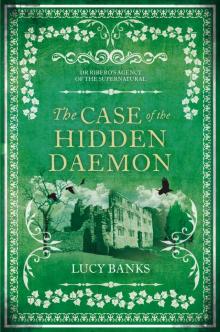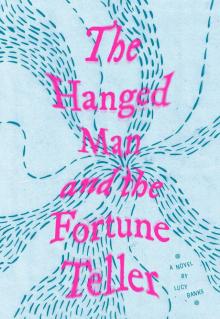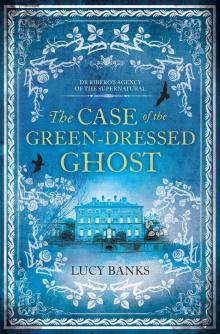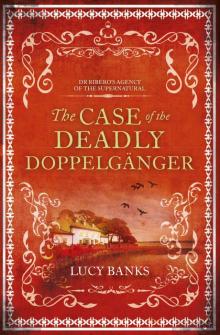- Home
- Lucy Banks
The Hanged Man and the Fortune Teller Page 2
The Hanged Man and the Fortune Teller Read online
Page 2
The Fortune Teller slips a spectral hand in his. It shudders the air, before returning to normal. “You cannot go on like this.”
The words jolt him, then he realises her meaning; quite different to the secret feelings hidden within himself. “I don’t understand,” he replies.
“You do. You understand very well.”
Perhaps, he thinks.
She wants him to change, he knows; to return to something more like what he once was; and to reclaim the memories of his past life. But she doesn’t realise that he is in freefall, cascading along a path that he has no control over. It has been this way since he left his living body; a slow, crushing decline to forgetfulness. Towards a total lack of being. But isn’t that what he yearns for, after all? To put a stop to all of this?
“Since when was memory such a desirable thing anyway?” he says wryly, watching her out of the corner of his eye.
A smile tugs at the mist of her lips. “I remember my life. Parts of it, anyway. And I take pleasure in those memories.”
“I don’t wish to remember. And don’t tell me your memories either, I cannot endure it, not at present.”
“You were there for part of it, some of my memories are your memories too.” She waits patiently for him to meet her gaze before continuing. “It’s because of you that I’m here now. Don’t you want me to tell you, to help you remember it?”
He moves away, closer to the breeze of the river. It is a cooler night than yesterday. Sometimes, he lifts his head to the sky and imagines the air, tickling his skin; the kiss of a gust of wind, before it flies to a neighbouring tree. The living don’t know how lucky they are, he thinks. Nature caresses them ceaselessly, and they don’t even notice it.
“You spoke to me, when I was alive.” The Fortune Teller is behind him, beside him, suddenly all around him. He cannot keep track of her movements. “You used to beg me to look for your wife. Then you talked to me about love…”
“Stop it,” he whispers.
“You said you’d keep looking for her, no matter how long it took. But instead of remembering, it’s all becoming distant, isn’t it? Do you even recall my name?”
He shakes his head, though it pains him to admit it. A cloud slips over the sun, and the water loses its shine, fading to gunmetal grey.
The Fortune Teller stops. Her form quivers, restless and anxious. She is worried, he realises. She is just as frightened about what is happening to me as I am.
“You don’t remember me at all, do you.” It is a statement, not a question.
“I’m sorry.”
He feels a tingle at the crook of his elbow. It is her hand, squeezing him briefly, making the air glisten. Then she is gone, absorbed into the surroundings as though she’d never been there at all. Goodness knows where she vanishes to each time, though her disappearances have been less regular as of late. He knows he should feel guilty, driving her away with his taciturn comments, but as it is, he relishes the chance to be alone.
After all, he thinks, as he glides back to the boy, to his sorrowful messages of love, it isn’t personal that I can’t remember who she is. I don’t remember myself, either.
Night sets in and the ghost returns, back to the hovel at the top of the terraced house. The boy does not go to work the following day, nor the day after that. Long hours pass, and the ghost settles by the empty fireplace, waiting and watching. It confuses him, how someone can spend so much time doing so little. He remembers, as a child, reciting a line about the devil, and his ability to make work for idle hands. Though, presumably, Satan has eased his grip on twenty-first-century dwellers, who seem to enjoy spending hour after hour doing nothing at all.
The boy reads a book, some scrappily bound tome with a skeleton on the front. He eats, discards empty bowls, then lies on the floor, staring at the dirty ceiling. The ghost wishes he could offer some comfort, but the boy’s pain is too raw, and he fears getting too close. It may cause disruption to them both. Instead, he merely observes, seizing the chance to focus on someone else’s emotions, rather than his own. Better to be the invisible observer, the bit part in someone else’s life performance. It’s far less agonising to endure.
Finally, the boy grabs his jacket and heads for the door. It’s obvious where he’s heading to. The ghost has sensed the boy’s yearning for hours, gnawing at him, causing his mind to fray at the edges. He needs to see a message from his lover, like a drowning man needs a helpful rope to pull him from the waters. Without it, he will surely fade, every bit as much as the ghost himself.
It’s a chillier night than usual, but the boy seems oblivious, thudding along the pavements, intent on his destination. He fails to greet the proprietor of the place of screens, only slams his bag on the desk and throws himself into the nearest chair. Music tinkles from a machine out back, from a room that’s filled with boxes and old magazines. It is a cheery tune, something with a frenetic drum beat, which the ghost understands is popular these days. The boy doesn’t seem to notice. He only has eyes for the screen, the singular screen, which even now is glowing and whirring to life.
An image of a rolling field appears, triggering another half-remembered thought in the ghost’s mind. He watches as the boy moves the mouse around, jerky motions that betray the truth of his heart. The truth of panic, fear, and desperate, overwhelming love.
The ghost senses this will not have a happy outcome. There is a darkness, a thick syrup of anticipation, which humans seem unaware of; and as it appears, the ghost gags, knowing if he follows the dark to its root, he will find the knot of it, the tangled heap of knowledge that leads to the future. He doesn’t want to know this boy’s future. The responsibility is too huge.
Let it be a kind message, he wishes instead, positioning himself behind the chair and waiting for the boy to start reading.
Bo,
I hate to say this, but I think it’s better if we cool it for a while. I need to focus on stuff here. We can still talk, just not every night, okay? Please don’t be sad.
Zoe x
The boy’s agony envelops him like a cloud, sending the room into a storm of colour and speed. The ghost knows it is too late to move away, so braces himself, pressing into the floor, fighting to find a root of calm amongst it all. He isn’t angry at the boy, he understands it only too well. I have been here too, he thinks, waiting for the madness to pass. I know what this feels like.
Finally, the ghost can open his eyes again. The boy’s forehead is pressed against the desk, hands braced at the back of his neck, and dark lingers around him, a brooding cloud of misery. The ghost does not dare come too close, for fear that it will submerge him, that he’ll be forced to see what lies ahead.
“It is a monstrous thing,” he whispers, to no one in particular.
The boy lifts his head, turns, and his eyes narrow. For a brief moment, the ghost feels watched, or at least sensed. The invisible thread that ties them together tightens, like a tug-of-war rope, then slackens and drifts.
He isn’t surprised to see the Fortune Teller beside him, waiting to be noticed.
“Can you see this boy’s future?” he asks, refusing to meet her gaze, to peer through the misty remnants of a spectral face.
“No. Not unless I enter the black, which I have no intention of doing.”
The ghost laughs. “I thought that telling the future was what you did.”
“Not like this. Not without my cards.”
He nods, hearing the truth in her words. Half-remembered visions of her deck spin into mind—bright images of people, coins, swords, cups—printed onto a grubby, well-handled pack. Others had been charlatans, but she’d had real talent.
That’s how she spoke to me, he remembers. While staring at her candle, in her tent. The only living creature to hear my voice. Suddenly, he can see the blotchy mirror hanging on an Asian screen, the scratched table. An obligatory crystal ball, smaller than he’d originally imagined. It is there, in his mind, blisteringly clear,
and he bathes in the certainty of it, knowing that it will pass before too long.
“I recall them,” he mutters, remembering one card in particular; a man, suspended from a strange, T-shaped tree, one ankle strung to the branch, the other crossed neatly behind the knee. He’d had a halo circling his head, a grim interpretation of saintliness. The Hanged Man. That was what it had said, in rough capitals at the bottom. He shudders, remembering a hushed woman’s voice. You will make a sacrifice. Strange, those words. Hastily, he puts them from his mind.
The boy cracks his knuckles, bringing him back to the moment.
“You remember my aunt’s tarot pack?” The Fortune Teller smiles. “That is good. What else can you remember?”
This is what she fails to understand, every time they talk like this. Her continual questions stopper him up, corking the flow of his thoughts. Just like that, the memory slides away, leaving him disorientated. What did I just see? he wonders. Already, it seems like a half-remembered dream, floating into the distance.
A rattle of noise sends the memory even further adrift. It is the boy, pressing at the letter board, fingers flying from button to button. The ghost cannot follow at such a speed, so studies the screen instead, watching the words, stunted and baffling as they are, fill the whiteness.
Zoe,
You’re breaking my heart. You’re killing me. Why are you treating me like this? What about that night, before you left, when you said you would never get tired of me? Was that just lies? You let me hold you, all night, and you said going to college wouldn’t change anything. But you lied. Are you hooking up with someone else? Is that it?
The ghost and the Fortune Teller glance at one another, and instinctively back away. He notices a tear on the boy’s cheek, and watches it travel slowly towards the side of his mouth. It leaves a snail-trail of sadness, closely followed by another tear, which follows a different path.
It is like life itself, the ghost thinks. We’re all carried along by the forces that drive us, and where it will take us, no one knows.
“If he carries on writing this, he will regret it,” he says.
The Fortune Teller sighs, and he can almost imagine feeling the tickle of breath on his cheek. “Maybe it is for the best. Who knows?”
But the ghost remembers the darkness before, the low-hanging fug that almost submerged the boy’s head, touching his scruffy, childlike hair. The meaning had been clear, even without stepping too close to it. One path, leading to trouble. A single version of the future, hanging in the balance.
Like a Hanged Man, he thinks, then wonders why.
“His heart will break,” he says.
“Then it will mend soon after.” The Fortune Teller may be right, but then, has she ever had her heart broken? Does she know the agony, palpable as a punch to the chest, or the inability to escape it? He doesn’t think so. She’s never known the perpetual pain of losing the one she loves. Heartbreak is only interrupted by the short bliss of falling asleep, simply to realise, on waking, that the torment is still there. It is a nagging, persistent weight that will not lift.
I knew it once, he realises. A glitter of pain bursts within him, like the aftershock of a distant earthquake, then settles and dies. He is more sensitive to these feelings when he’s around the boy, which perhaps explains why he clings to him.
“He is still writing.” The Fortune Teller points. More words of pain, black and ragged across the screen. The boy is falling, he can tell; plummeting into greater despair with every tap on the letter board.
The blackness thickens like sauce. The ghost would struggle to breathe, if he had lungs to inhale with. I must stop him, he thinks, unable to guess why, but only convinced that the dark will be worse if the message is sent, if Zoe reads the boy’s open wound, dripping through the words.
He edges closer to the screen. It flickers in response.
“What are you doing?” The Fortune Teller stills, tensing.
“I’m not doing anything.” I don’t have much time, he realises, and steels himself.
The buzz of the machine is tracing through him now, disturbing the strange energy that makes up the ghost’s form. Like a lifeline, it pulses, and as he draws nearer, the vibrations grow into a throb. It fascinates him, this proximity to self-damage. Both he and the boy, thinking the same, dark thoughts, driven by the same unhappiness.
The Fortune Teller grasps at his shoulder, before pulling away.
I will do it, he thinks. For the boy. And for myself. I will stop the darkness from falling.
He hears the Fortune Teller’s voice, a vague echo of a scream, as he dives towards the screen, breaking like a water drop against the bright, buzzing surface. For a moment, there is only noise; the sizzle of burning, the snap as something tightens and breaks deep within the machine itself. Another part bangs, breaking against the elements of himself that are spreading through the strange wires and metal components.
It is agony, though agony of a different kind to when he was living; a sense of unbearable pressure, noise, and loosening, as though the very essence of himself is bleeding outwards and diluting away. He closes his eyes and endures, with relief in his heart.
Then, silence.
It is done, he thinks. And finally, he rests.
THREE
— 1877 —
“GOODNESS, YOU LOOK the part.” Arthur stood back to admire me, then resumed smoothing down his suit jacket. The buttonhole flower was already wilting in the heat, petals curling like peeling wallpaper.
I grinned. “I should jolly well think so. After all, if a man isn’t dandied up to the nines on his wedding day, when can he be, eh?”
“Well, you look positively afternoonified.” He straightened my waistcoat, then picked up the top hat, thumping it on my head before I had a chance to protest. “There. A fine gentleman and no mistake. I can scarcely believe you’re my brother.”
It was a splendid day for a wedding, as Mother had predicted yesterday, peering into her usual morning tea leaves. I told her it was all stuff and nonsense, which had made her chuckle. Dear old Mother, she still clung to her superstitions. It was part of living in a village, I presumed, where the local residents still crossed themselves at the sight of a black cat. We’d always laughed about it as children, and it still amused me as a full-grown man.
I wondered how Eleanor was getting on, and whether she was feeling as nervous as I was. No doubt her aunt was fussing over her right at this very moment; dabbing her eyes and muttering about her poor, dear parents, as she always seemed to do at every opportunity. Eleanor once confided in me that she wished she felt more grief over her parents’ death, but then, she’d been a baby at the time; and the only lasting impact was her reduced circumstances in life, moving from a London townhouse to a diminutive terraced cottage in Battersea. Her misfortune had been my gain though, for if she hadn’t come here, I’d never have known her.
How fate moves us in strange, unexpected directions, I thought, reviewing my appearance in the looking glass, and smoothing down my morning jacket. We never know what the future has planned for us.
“Here,” Arthur said, smoothing down my collar. “you’ve got a bit of dust on you, and we can’t have that.”
“You’re as bad as Mother, fussing over me.”
“Well, enjoy it while it lasts. It will be your lady wife doing this tomorrow morning.”
My lady wife. I took a moment to let the words sink in. As children, we’d all played together; running through the woods, fishing in the local pond, eating buns on the church wall. It seemed astounding to think that the pretty, curl-headed girl I’d adored as a child should now be my wife. Thank heavens she chose the right brother, I thought, with a rueful smile. Things could have easily turned out differently.
Our new house was ready and waiting, already filled with furniture; some new, other items generously donated by Mother from her cluttered collection. It overlooked the Thames, and I could scarcely wait to move in.
To be a husband, at last. To provide for my wife and keep her in a manner to which she can become accustomed. Lord knows I felt ready enough for the task; I’d been working hard at the office.
“So,” Arthur declared, interrupting my thoughts, settling into the armchair by the fireplace. “Is Fred coming?”
I darkened at the mention of my older brother’s name. Not today, of all days. “You know as well as I do,” I replied, trying not to sound testy. “In fact, probably better, given that you spoke to him only last week.” Arthur may have been younger than me by a year and a half, but he was far better at keeping the family peace than I ever was.
“Fred is a damned nuisance sometimes. I do wish he’d considered your invitation.”
“Fred only considers himself, I believe.”
Arthur’s eyebrow shot up. “That’s hardly fair. Life hasn’t been kind to him, has it?”
Fred’s hardly been kind to life, either, I thought childishly, but kept my thoughts to myself. I knew, deep down, that I’d contributed to my older brother’s unhappiness, which made my cruel thoughts even more unacceptable, I supposed.
“Well,” I replied in a lighter tone, determined not to let anything spoil the day. “He declined to come, so let’s discuss other matters, eh?”
Arthur nodded. “Quite right, we can’t sit here debating ridiculous family squabbles. We’ve been over it far too many times in the past. He’ll come around in the end.”
Or not, I thought, musing on Fred’s general surliness and bad manners. Still, it was pointless to dwell on it, particularly today.
Arthur caught my eye, then grinned. “I say, hadn’t we better go? Time’s getting on, we don’t want to be late.”
I nodded. “We should. And let’s agree to not mention Fred again. It’ll only upset Eleanor.”

 The Case of the Hidden Daemon
The Case of the Hidden Daemon The Hanged Man and the Fortune Teller
The Hanged Man and the Fortune Teller The Case of the Green-Dressed Ghost
The Case of the Green-Dressed Ghost The Case of the Deadly Doppelgänger
The Case of the Deadly Doppelgänger